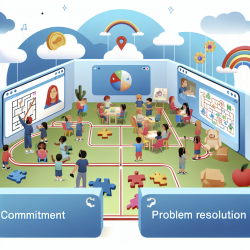Introduction
In the rapidly evolving field of educational technology, serious games are gaining traction as effective tools for both data collection and education. However, assessing their efficacy, particularly in sensitive areas such as sex education, presents unique challenges. A recent study titled Outcomes assessment pitfalls: challenges to quantifying knowledge gain in a sex education game explores these challenges and offers insights that can help practitioners improve their approaches to educational game design and assessment.
Understanding the Study
The study focused on the "My Future Family Game" (MFF), a tool designed to educate adolescents about human sexual anatomy and reproduction while collecting data on family planning intentions. Conducted in Chennai, India, the research aimed to evaluate the game's effectiveness in teaching sex education using a pre-post assessment model.
Key Findings and Challenges
The study identified several challenges in assessing knowledge gain through serious games:
- Communication Barriers: Cultural taboos in discussing sexual topics posed significant hurdles. The game needed to introduce explicit material gradually and contextually to avoid discomfort.
- Interface Design: The drag-and-drop interface was initially unfamiliar to players, complicating the assessment process. The study highlighted the importance of designing intuitive interfaces that align with the educational goals.
- Ensuring Engagement: The pre-test assessment felt like a formal test, undermining the playful nature of the game. This affected student engagement and the validity of the assessment data.
- Post-Test Adherence: Many students skipped the post-test or rushed through it, resulting in incomplete data on knowledge gain.
Recommendations for Practitioners
Based on the study's findings, practitioners can enhance the effectiveness of educational games by:
- Integrating Assessments Seamlessly: Embed assessments within the game narrative to maintain engagement and reduce the perception of testing.
- Utilizing User-Friendly Interfaces: Design intuitive interfaces that facilitate learning and assessment without technical distractions.
- Addressing Cultural Sensitivities: Introduce sensitive content thoughtfully and contextually to align with cultural norms and reduce discomfort.
- Encouraging Engagement: Foster a playful environment by minimizing formal testing pressures and emphasizing the game's educational value.
Encouraging Further Research
The study underscores the need for more research in the field of serious games, particularly in assessing knowledge gain in sensitive topics. Practitioners are encouraged to explore innovative assessment methods and share their findings to contribute to the growing body of knowledge.
Conclusion
Serious games hold significant potential for education and data collection, but their success hinges on overcoming assessment challenges. By implementing the study's recommendations, practitioners can enhance the efficacy of educational games and create meaningful learning experiences for children.
To read the original research paper, please follow this link: Outcomes assessment pitfalls: challenges to quantifying knowledge gain in a sex education game.










